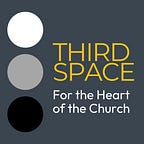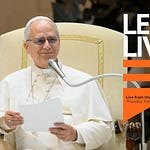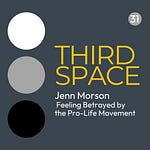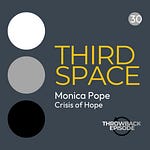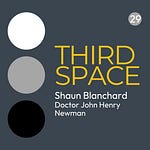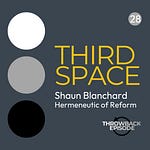In this first episode of 2025, I talked with my good friend and mentor, Monica Pope, about hope. We began by talking about the role of the catechist before launching into a catechesis about hope in light of the theme of the 2025 Jubilee Year, “Pilgrims of Hope.” All of that set up a more personal discussion about what hope actually looks like in our concrete lives. We proposed that hope is really only born out of a “third space” where the reality of all the bad is accepted—not bypassed—while holding onto the belief that God is good. Talking with Monica is always a consolation for me, I hope that’s your experience as well.
Monica Pope has been doing evangelizing catechesis for 30 years in the Catholic Church. She has worked in Michigan parishes as Director of Catechesis, RCIA leader, and Director of Discipleship Ministries. Monica has created family catechesis programs in several parishes; she’s formed many dedicated and gifted Catholic disciples to be effective catechists. She’s written and led hundreds of retreats, presented for thousands of people, ranging from First Communicants and their parents, to senior residents at assisted living facilities, to employees of diocesan chancelleries. These days she’s a master catechist for a catholic media company. And cofounder of Practical Kerygma.
LINKS:
Practical Kerygma
https://www.practicalkerygma.com/
Spes Non Confundit - Bull of Indiction of the Ordinary Jubilee of the Year 2025
Details for my Winter 2025 spiritual abuse workshop are here:
https://www.catholicthirdspace.com/p/spiritual-abuse-workshop-7b6
ABOUT THIRD SPACE: Third Space is the podcast for those who see the beauty of Catholicism, as well as the ugliness, who have experienced real harm AND real grace in the Church. Every episode I will have conversations with guests about the good and the bad in the Church—avoiding easy answers or black & white fundamentalism—in order to hold on to all that is true.
SUPPORT THIS SHOW: Please consider becoming a paid subscriber. All of your support directly helps my family and allows me to continue working on projects like this podcast, the newsletter, as well as resources about spiritual abuse in the Catholic Church.
www.catholicthirdspace.com
ABOUT THE HOST: Paul Fahey lives in Michigan with his wife and five kids. He is a limited licensed professional counselor, retreat leader, and catechist. He is a co-founder of Where Peter Is, founder and co-host of the Pope Francis Generation podcast, and the host of the Third Space podcast. He seeks to provide pastoral counseling for Catholics who have been spiritually abused, counseling for Catholic ministers, and counseling education so that ministers are more equipped to help others in their ministry.

